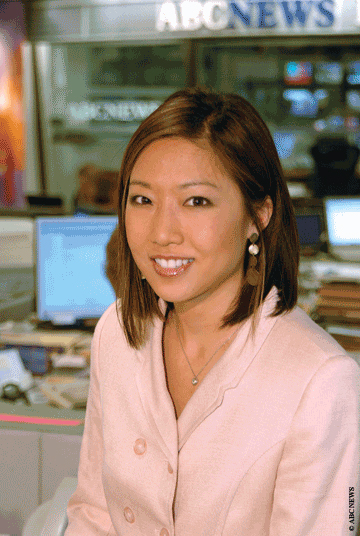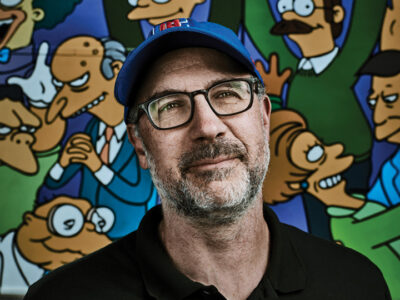
Class of ’99 | When Stephanie Sy C’99 was a senior at Penn, double-majoring in environmental studies and international relations (IR), she wrote her senior thesis on China’s energy crisis and its effects on the environment.
“I could never have imagined I would be reporting on those same issues as a journalist almost 10 years later,” says Sy, now the Asia correspondent, based in Beijing, for ABC News. “A lot of the subjects in IR gave me a theoretical framework for understanding what is happening in global politics—from nuclear proliferation to the struggle for natural resources.”
Similarly, one of the first theories she learned about in environmental studies—the Gaia hypothesis—impressed on her “that the Earth is one interconnected, living organism and should be viewed holistically,” she recalls. “I think, in some way, that sort of knowledge informs what I do.”
Sy suggests that “the journalism bug runs in my blood,” since her mother was an aspiring journalist who immigrated to the U.S. from Taiwan in the 1960s and enrolled at the University of Missouri as a journalism major. Stephanie served as editor of her junior-high and high-school newspapers, and chose Penn because she was “really impressed with the DP.”
After a stint with WBTW-TV (CBS) in Florence, South Carolina, Sy’s career took off while covering the 2003 invasion of Iraq for another CBS affiliate in Norfolk, Virginia, and later that year she was hired by ABC. Though she went to Baghdad a few times for ABC News, and covered the trial of Saddam Hussein, she says she was “stuck in our secure compound” for most of the three-week stretches she was there, since “journalists were being kidnapped and killed.”
“You got used to the car bombs going off at all hours of the day,” she adds. Yet by talking to Iraqis, she quickly learned just how complex the situation there really was.
“When you just read the press reports and watch the news once in a while, you might get the impression that all Iraqis are extremists and all Sunnis and Shiites hate each other,” Sy explains. “As clichéd as it sounds, the one thing you learn over and over in covering stories in different parts of the world is that, in the end, people are people.”
While she is leery of using phrases like most proud of to describe her reaction to her best work, she allows that she is happy when she’s able to “tell a story that inspires viewers.”
“I did a few pieces at the Special Olympics, which were held in Shanghai recently,” she says. “There was a young gymnast we profiled on World News named Houston. He was born to a crack-addicted mother and had a broken rib and a hole in his heart when he was adopted by a wonderful couple from Texas. He ended up winning a medal at the Special Olympics, and he was such a courageous, vivacious, wise child. I just had a great time hanging out with him and interviewing his parents. A few people told me they cried when they watched the piece. It was a hopeful story.”
Sy answered some questions about her work from Gazette senior editor Samuel Hughes.
Do you have any special qualifications for the Beijing bureau (e.g. speaking Chinese)?
My parents did their best to speak Mandarin to us when we were growing up, but I think they gave up after a while, and just spoke English. I wasn’t one of those Chinese-American kids who was forced to go to Chinese classes every Saturday, so I studied Mandarin at Penn. I can’t remember if that was because I wanted an easy pass on the language requirement (I did speak a little) or because I was genuinely interested in China. I certainly chose correctly. I spent a semester junior year in Hong Kong, studying Mandarin (even though they speak Cantonese there) and learning about the politics, economics, and history of China.
As I worked my way up through local news and then the network, China kept growing in relevancy. The opportunity came up at ABC, and it seemed to be the right fit and timing. My vocabulary is limited, but it is improving.
Any observations about China that haven’t made it into your reports?
China is the most challenging assignment I’ve had. It can be very difficult to operate here, because there is a lot of bureaucracy. More than that, there is an underlying distrust of the media, especially the foreign media. There has been some opening, but the reality is that it is still difficult to get access to government officials at all levels. And it is especially interesting being a Chinese American here because people consider me Chinese, and expect me to speak Mandarin fluently. Most people don’t understand the concept of there being anything else except white Americans.
There is a sort of mini-identity crisis that occurs every morning when they stop me outside the diplomatic compound where our office is. The guard always waves in white or black foreigners, but if they think you’re Chinese, you can’t go in the compound. So, every morning, I have to roll down the window and yell, “I’m American!” They always eye me suspiciously, and this morning, I even had to show my passport. What is so frustrating about that is that there seems to be some underlying inferiority complex that drives many Chinese attitudes toward foreigners. I’ve discussed this with other Chinese-American journalists here, and they all have similar experiences.
Given the cutbacks in foreign bureaus, what does the future look like for international reporting?
ABC News has actually expanded its foreign coverage recently by hiring these one-man bands that we call digital reporters. They are reporters who can shoot, write, and, in a pinch, go on-camera. We have them scattered all over the world: India, Africa, South America, the Middle East. Network television is changing. It is expensive to hire crews, but I think ABC realizes the importance of continuing to report the world. So there have been some cutbacks, but also some expansion. It seems to be working really well.
As a correspondent, I am not expected to shoot or edit my pieces, but I think in the near future, there will be more and more expectations for us to have the ability to do so. In my very first job in Florence, South Carolina, I had to shoot, edit, anchor … so I have a pretty good idea how it all works if I ever have to do it. These days, exclusive access has taken the place of video quality. You see a lot more video on the news that has been taken with a camcorder or even a cell phone camera. The television news business is evolving, and I’m still not sure how I’ll fit in in the future.




